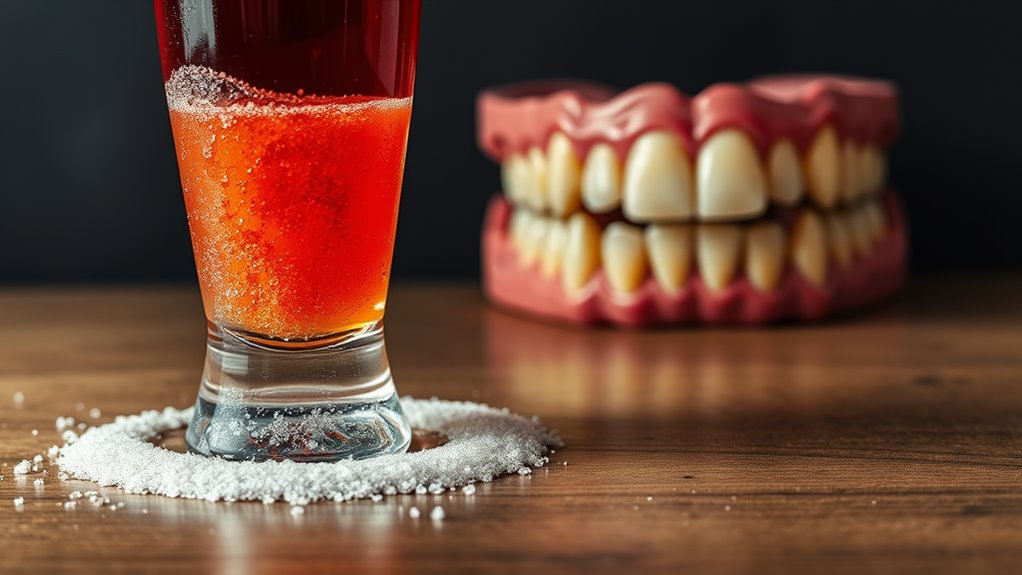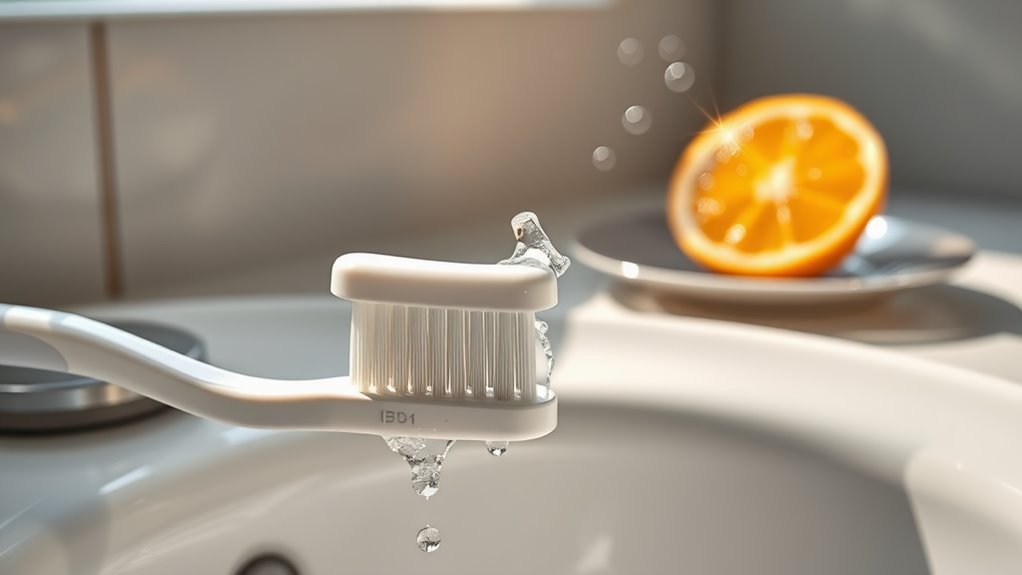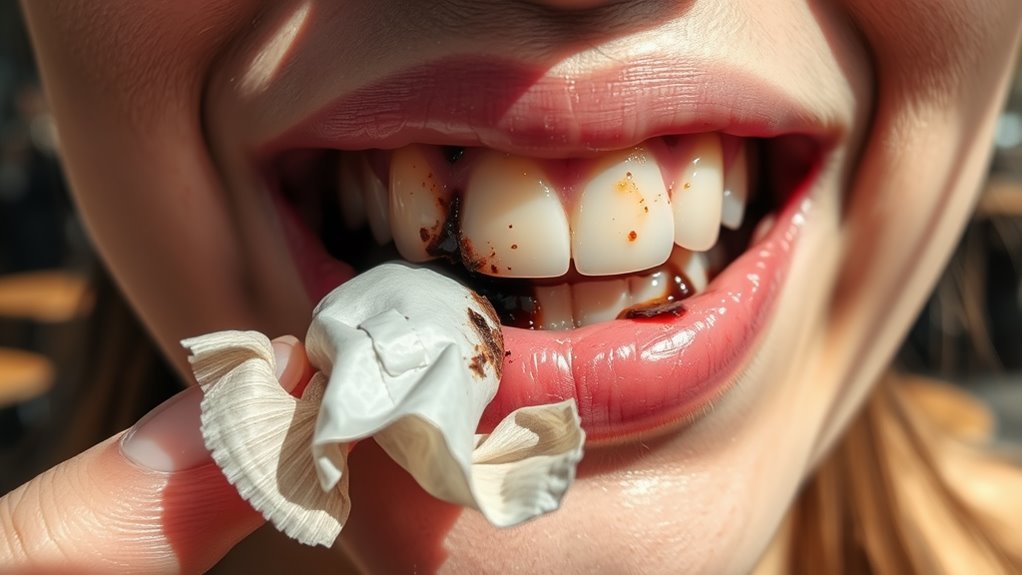This One Habit Can Weaken Your Teeth Over Time
Key Takeaways
- Regularly consuming sugary foods fuels bacteria that produce acids, eroding tooth enamel over time.
- Inadequate oral hygiene allows plaque to build up, increasing the risk of decay and enamel damage.
- A diet high in acidic foods can weaken enamel, leading to increased tooth sensitivity and cavities.
- Medications causing dry mouth can reduce saliva, which is vital for neutralizing acids and protecting teeth.
- Skipping routine dental check-ups prevents early detection and treatment of potential dental issues, exacerbating enamel wear.
The Impact of Sugar on Tooth Enamel
How does sugar affect your tooth enamel? Consuming sugar fuels harmful bacteria in your mouth, leading to acid production that erodes your enamel. This process contributes to teeth weakening habits, increasing sensitivity and the risk of cavities. To protect your enamel, limit sugar intake and maintain a consistent oral hygiene routine. Being proactive now helps preserve your dental health for the future. Additionally, be aware that sugary snacks can significantly increase the risk of dental issues by promoting the growth of harmful bacteria.
Understanding Tooth Decay
Tooth decay is a common issue that arises from various factors, including poor oral hygiene and excessive sugar intake.
It can lead to painful cavities and affect your overall oral health.
Understanding the causes and effects of tooth decay is essential for maintaining a healthy smile. Additionally, genetic factors such as enamel strength can significantly influence your susceptibility to cavities.
Causes of Tooth Decay
While many people may not realize it, a combination of poor oral hygiene, dietary choices, and certain medical conditions can greatly contribute to tooth decay.
Neglecting regular brushing and flossing allows plaque buildup, while sugary and acidic foods can erode enamel.
Additionally, conditions like dry mouth or certain medications can reduce saliva, hindering the mouth’s ability to naturally combat decay.
Stay vigilant about your dental health.
Effects on Oral Health
Neglecting dental care can lead to a number of negative consequences for your oral health. Understanding these effects is essential to maintaining a healthy smile.
You might experience:
- Increased tooth sensitivity
- Cavities and tooth decay
- Gum disease
- Bad breath
- Tooth loss
Taking care of your teeth now can prevent these issues from escalating in the future.
How Bacteria Feast on Sugar
When you consume sugar, oral bacteria thrive on it, leading to their rapid multiplication. These bacteria break down sugar and produce acids as a byproduct, which can erode your tooth enamel. Understanding this process can help you make better choices for your dental health. Maintaining good oral hygiene is essential in combating the effects of these harmful bacteria.
Sugar and Oral Bacteria
Many people don’t realize how much sugar in their diet can impact oral health.
When you consume sugary foods, harmful bacteria in your mouth thrive, leading to potential dental issues.
Remember to take into account the following:
- Choose whole fruits over sugary snacks
- Read food labels carefully
- Limit sugary beverages
- Maintain regular dental check-ups
- Practice good oral hygiene
These steps can help protect your teeth.
Acid Production Process
Consuming sugar doesn’t just feed your sweet tooth; it also fuels harmful bacteria in your mouth.
These bacteria thrive on sugar, metabolizing it into acids that gradually erode your tooth enamel. This acid production leads to cavities and other dental issues, making proper oral hygiene essential.
Limiting sugar intake can dramatically reduce this harmful process, helping to protect your teeth over time.
The Role of Saliva in Protecting Teeth
Although you mightn’t realize it, saliva plays an essential role in protecting your teeth from decay and damage.
It helps maintain oral health by:
- Neutralizing acids produced by bacteria
- Providing minerals that strengthen enamel
- Aiding in food digestion
- Washing away food particles and debris
- Enhancing taste perception
Keeping your mouth hydrated guarantees saliva can effectively perform these protective functions. Additionally, good oral hygiene ensures that harmful bacteria are minimized, allowing saliva to maintain its protective role.
Alternative Snack Options for Dental Health
While snacking can often lead to cavities and dental issues, choosing the right options can markedly enhance your oral health.
Opt for crunchy vegetables like carrots or celery, which help clean teeth as you chew. Fresh fruits, particularly apples and pears, can also be good choices.
Unsweetened nuts and cheese provide essential nutrients while supporting enamel strength, making them excellent alternatives. Additionally, opting for healthier snacks can significantly reduce the risk of harmful bacteria that contribute to gum disease.
Effective Oral Hygiene Practices
Effective oral hygiene practices are essential for maintaining a healthy smile and preventing dental issues. To take care of your teeth, follow these guidelines:
- Brush twice daily with fluoride toothpaste
- Floss daily to remove plaque between teeth
- Use an antibacterial mouthwash
- Replace your toothbrush every three months
- Limit sugary snacks and beverages
Incorporating sufficient Vitamin D sources into your diet will also help strengthen your teeth. Implementing these habits will keep your teeth strong and your smile bright.
Regular Dental Check-ups and Their Importance
Even with solid oral hygiene practices in place, regular dental check-ups play an essential role in preserving your tooth health.
These visits enable your dentist to identify potential issues early, preventing more serious problems down the line.
Routine cleanings also remove plaque and tartar buildup that brushing alone might miss.
Prioritize these appointments to maintain a healthy, vibrant smile throughout your life.




